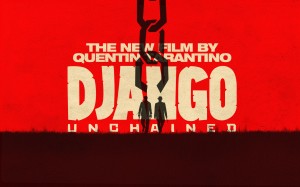DJANGO UNCHAINED: 4 STARS
 In a movie ripe with film homages, one stands head and shoulders above the rest as the film’s best meta-moment. In Quentin Tarantino’s unhinged Spaghetti western “Django Unchained” Jamie Foxx plays the title character, a slave-turned-bounty-hunter on a search for his wife.
In a movie ripe with film homages, one stands head and shoulders above the rest as the film’s best meta-moment. In Quentin Tarantino’s unhinged Spaghetti western “Django Unchained” Jamie Foxx plays the title character, a slave-turned-bounty-hunter on a search for his wife.
On his journey he encounters a slave trader played by Italian star Franco Nero. Over a drink, Nero’s character asks Django his name. “Django,” comes the reply. “D-J-A-N-G-O… the D is silent.”
“I know,” says Nero.
The sound you are hearing is the squeal of film nerds. It’s a high-pitched grunt mixed with a sudden intake of air, the gasp of a movie fanatic whose mind has just been blown.
You see Nero (whose credits reads: “With the friendly participation of Franco Nero”) originated a gun slinging character named Django in a legendary 1966 eponymously titled movie.
“Django Unchained” is heavy with references, both visual—lots of zooming cameras a la Sergio Leone—location wise—he borrowed the snow setting from The Great Silence—and even just a little bit silly—Kerry Washington’s character’s last name is Von Shaft in tribute to Richard Roundtree’s most famous character—but only King of the Film Geeks, QT, would think to have two worlds collide by presenting dueling Djangos.
Tarantino brings his unique sensibility to every frame of “Django Unchained.” It’s an uncompromising film, violent, grimly funny, and one in which the “n” word is as prevalent as any other noun. Like him or not, there is no denying that he is as true to his singular vision as any of the great filmmakers he pays homage to.
Set two years before the Civil War, the film begins with Django (Foxx) in chains, being transported deep inside the Deep South by vicious slave traders the Speck brothers (James Remar and James Russo). On a remote country road they meet Dr. King Schultz (Christoph Waltz), a courtly German bounty hunter—so courtly he even has a horse named Fritz who bows— who has been tracking Django. There’s no reward for the slave; what he has is more interesting to Schultz—information.
The bounty hunter is looking to hunt down and kill a ruthless band of killers called the Brittle Brothers. Trouble is, he doesn’t know what they look like, but Django, who was beaten by them and whose wife, Broomhilda (Kerry Washington), was taken by them, does. They forge a deal. In return for his help Django will earn his freedom and Shultz will help find and rescue Broomhilda.
Django agrees to go into business with Shultz—“Kill white folks and get paid for it? What’s not to like?”—which leads them to Candie-Land, the plantation of the charming but vicious Calvin Candie (Leonardo DiCaprio). Despite the name, there’s nothing sweet about him or the place.
Tarantino is one of the handful of over-the-title directors who name is as big a draw as the story or actors. Even though there are big stars here like DiCaprio and Foxx, “Django Unchained” is first and foremost a Tarantino movie, with all that implies.
His trademarked anachronistic soundtrack—mixing 60s pop with religious music and rap—butts heads with violent but beautiful flourishes—like blood splattered cotton blossoms—in a movie that blends Spaghetti westerns with German fairy tales, revenge flicks and Hollywood history.
It a high wire act, tackling issues of the US’s relationship with slavery, racism and the exploitation of women with equal parts earnestness, style, violence and humor.
As satire a scene involving hooded white supremacists arguing over the placement of the eyeholes on their homemade cowls–“I can’t see **** out of this thing!”—is a pure Tarantino moment—acerbic, ridiculous and fearless.
The flamboyant filmmaking seems to have freed the actors.
Waltz and DiCaprio have the showiest roles. Waltz is a bounty hunter with a conscience—he doesn’t want to take advantage of Django’s status as a slave, but “for the time being I’m going to make this slavery malarkey work for me,” he says. “Still, I feel bad.”—a former dentist who “kills people and sells their corpses for cash,” which is in direct opposition to the slave traders—who buys and sell live people—he hunts and kills.
DiCaprio’s rotten tooth grin belies how much fun he’s having playing a Southern gentleman who is anything but.
Foxx is more stoic, a coiled spring eager for revenge on the people who have done him and his wife wrong. The role isn’t without humor, however. Just check out the suit Django chooses when he is allowed to pick out his clothes for the firs time ever in his life.
“Django Unchained” is bloodier than you’ll expect—with a shootout as violently gratuitous as any gun battle ever filmed—and funnier than you think it is going to be. It’s a message movie and a pulpy crowd pleaser. In other words, it’s a Tarantino film.
